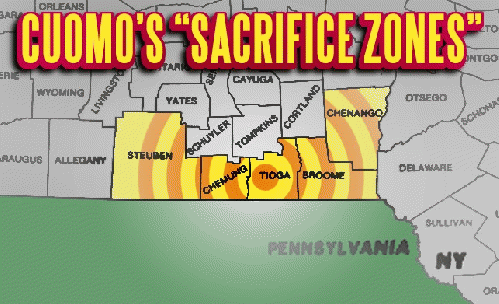>
Following recent announcements that Gov. Cuomo plans to approve hydrofracking permits in financially depressed counties along the state's Southern Tier, it has been revealed the New York State Department of Environmental Conservation quietly provided industry officials with distinct advantages before a highly anticipated environmental impact report went public.
Environmental Working Group obtained email records through New York's Freedom of Information Law which showed communications about provisions in the report were ongoing at least six weeks before anyone else got a chance to see them. Termed "stakeholder outreach", the secret heads-up represent an insulting breach of public trust, failing to consider voters, taxpayers, property owners or those who use water or breathe air as "stakeholders" equal in the process to the hydrofracking corporations.
"...drilling companies have received favorable treatment as the state plan has made its way to Cuomo's desk. A series of emails shows that regulators shared detailed summaries of the DEC plan with drilling representatives between Aug. 15 and Aug. 17 as part of a one-sided "stakeholder outreach." Only drilling industry representatives received these documents in advance. Other stakeholders, including local communities and public health and environmental groups were kept in the dark."
The secret communications included a last-minute pitch by a lawyer for Chesapeake Energy Corp. to weaken or eliminate testing for harmful radiation in fracking fluids that may be washed into drinking water during floods or storms. The naturally occurring radionuclides were found in wastewater at vertical Marcellus shale fracking sites at over 100 times the levels expected from safe drinking water. Horizontal hydrofracking could be even worse. Similar concerns have been found in water at PA shale sites.
The EWG expressed concern the DEC may have acquiesced to the industry as a result of their inside dealings because the Sept. 28 permitting requirements as issued failed to include measurable definitions of safe or unsafe radioactivity for runoff water, failed to specify penalties for companies who contaminate local waters and failed to describe state monitoring or enforcement mechanisms. This led EWG to believe the industry will largely have a free hand to pollute in any case.
What is missing from the email exchanges may prove just as alarming as what was found. Gaps described by EWG suggest even more communications between DEC and industry insiders may have been withheld, removed or taken place externally. See a detailed timeline of communications discovered here: Cuomo Team Gives Drillers Jump Start To Influence Industry Rules
A dismisive rebuttal by the industry claims "state law" required the DEC to seek feedback from those who would be regulated by the laws, yet left out why water consumers or landowners would not be considered among those being regulated -- or why it was not disclosed.
As we have reported here, NY's fracking permits represent a steamrolling of public sentiment, oblivious to the scientific evidence, statewide polls showing 2 to 1 opposition, legislation, litigation, the danger to human health, the environment, property values and the democratic process itself.
The process has been criticized at every turn, beginning with the decision to lift a moratorium shortly after Andrew Cuomo replaced Gov. David Paterson. The Natural Gas industry gave $4.5 million to state and local politicians and parties in NY to prime the pump in over 2,349 separate donations. Cuomo's campaign received $153,816 after announcing the Marcellus shale could boost the economy of the Southern Tier, but he also stated the drilling "must not come at the expense of human health or adverse environmental impacts".
Tellingly, the firm Cuomo hired to study the issue was Ecology & Environment, a consultancy with a number of natural gas drillers as clients. Even worse, E & E itself contributed to lobbying against bills seeking to regulate fracking practices, a glaringly unfortunate conflict.
The resultant report was challenged by environmentalists and economists, physicians, scientists and energy sector engineers as "baloney", for example omitting contingencies for the millions of gallons of toxic wastewater each well could produce. The report was considered incomplete and inconclusive on everything from radioactivity risks to seismic faults to floodplains, weighted towards sunny projections of jobs and cheap energy.
Out of 1,500 pages, only two were devoted to considering the option not to drill. A record-shattering 74,000 comments were received by the DEC, with over 200,000 signing anti-fracking petitions. 100 environmental groups have protested Albany as recently as two weeks ago. Left out of the report were hundreds of reported cases of contaminated properties on or near drill sites where settlements paid out were contingent on non-disclosure agreements, keeping the contamination secret. Because of the flaws in the DEC report, a state Assembly bill proposed June 20 now seeks a new independent health study.
Governor Cuomo convened a 13 member Hydraulic Fracturing Advisory Panel comprised of seven politicians, lobbyists, lawyers or natural gas cheerleaders. GasMain.org points out all have no relevant environmental or economic expertise. Worse, the other six panelists, all staffers or executives of "professional" environmental groups, were chosen to give the appearance of balance, but none actually support the actual grassroots outcry for a full ban on hydrofracking.
The DEC's public hearings were criticized for being too few (four events), too crowded, too short (140 speaking slots alloted for 270 speakers) and too remote.
I attended the evening session of the final hearing where I saw about 75 out of 80 speakers speak against fracking, including scientists, environmentalists, conservationists, elected officials, health advocates and activist groups. One speaker pointed at DEC commissioner Joe Martens and accused him of being "in the tank" for the industry -- the speaker was a DEC scientist.
(Note: You can view every article as one long page if you sign up as an Advocate Member, or higher).





